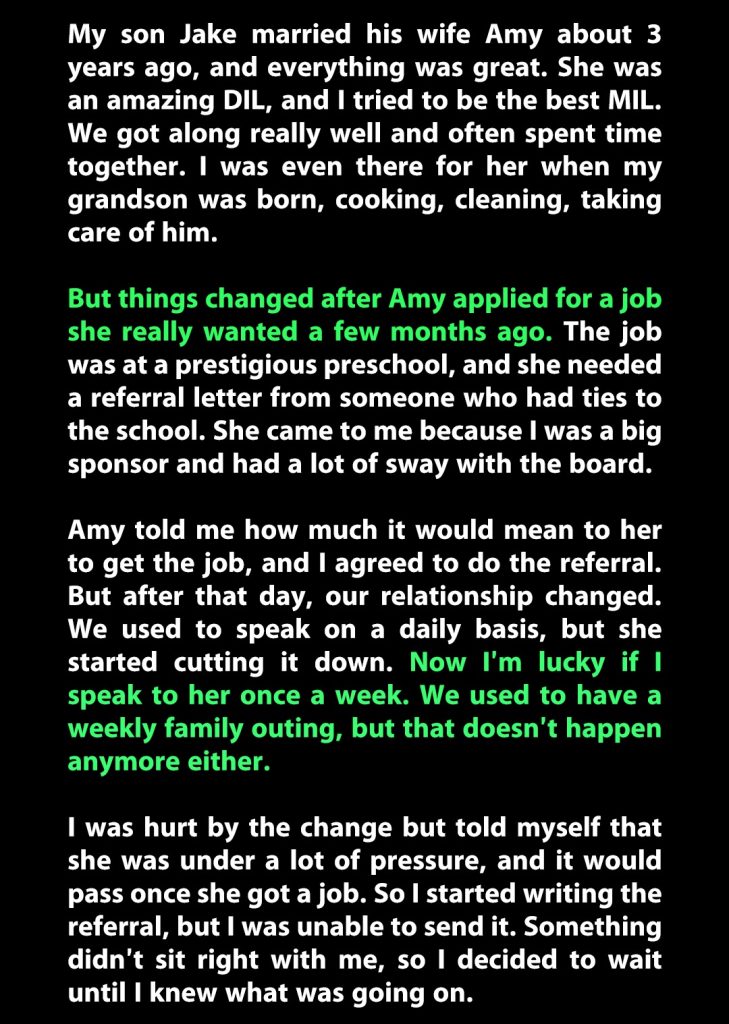I never imagined that the hardest part of motherhood would come after my son got married.
I’m 39, a young mother-in-law by most standards. I had my children early, and my husband’s success meant I could dedicate myself to raising them full-time. I wasn’t just a stay-at-home mom—I was the heartbeat of our home. When my kids grew up, I didn’t return to work. Instead, I poured myself into community service, volunteering, and homemaking. It wasn’t glamorous, but it was meaningful.
When my eldest son, Daniel, told me he was getting married, I was thrilled. I imagined Sunday dinners, shared holidays, and a daughter-in-law who’d become part of our family tapestry. But from the moment I met Rachel, I knew that dream was slipping away.
Rachel was sharp, ambitious, and unapologetically blunt. She had a corporate edge that made every interaction feel like a negotiation. I tried to welcome her with warmth, but she met me with ice. At their wedding, I handed her a gift and said it was from both me and my husband. She looked me dead in the eye and said, “Just your husband, right? I know it wasn’t your money.”
I swallowed the insult. For Daniel’s sake.
Then came the subtle jabs. She dismissed my volunteer work as “not a real job.” She’d roll her eyes when I talked about community events. She made it clear—she saw me as irrelevant. A relic. And worst of all, she made no effort to hide it.
I tried to talk to Daniel. He brushed it off, said Rachel was “just direct.” I even tried to speak to her myself, hoping for some kind of truce. She smiled politely and then went right back to her passive-aggressive digs.
The final straw came at a family dinner I hosted. I’d spent the day preparing a homemade meal—roast chicken, garlic mashed potatoes, fresh bread, and my signature lemon tart. As I plated the food, Rachel leaned in and said, “No wonder you have time to cook like this. You don’t do anything else with your day.”
That was it.
I turned to her, calm but firm, and said, “Rachel, this is my home. I’ve welcomed you into it with grace, despite your constant disrespect. But if you can’t treat me with basic decency, you need to leave.”
She blinked, stunned. Then she started to cry.
Daniel exploded. He called me a “huge asshole” and stormed out with her. The silence afterward was deafening.
But here’s the thing: I didn’t regret it.
For years, I’d let myself be diminished. I’d allowed Rachel to chip away at my dignity, all in the name of family harmony. But respect isn’t optional. It’s the foundation of every relationship. And if someone refuses to offer it, they don’t get to stay in your life—no matter who they are.
The payback wasn’t loud. It wasn’t cruel. It was a boundary drawn with clarity and strength. I didn’t scream. I didn’t insult. I simply reclaimed my space.
Weeks passed. Daniel didn’t call. I missed him terribly. But I also knew that enabling Rachel’s behavior would only teach her that cruelty has no consequences. And I wasn’t willing to teach that lesson.
Eventually, Daniel came by alone. He apologized. Said he hadn’t realized how deep the wounds were. We talked—really talked—for the first time in months. He admitted Rachel had a habit of pushing people away. He asked if I’d be willing to try again.
I said yes. But with conditions.
Respect. Boundaries. And no more pretending everything’s fine when it’s not.
Rachel came by a week later. She was quiet, subdued. She apologized—not perfectly, but sincerely. I accepted it. Not because I forgot, but because I believe people can grow.
Now, our relationship is cautious but civil. And I’ve learned something powerful: sometimes, the perfect payback isn’t revenge. It’s self-respect.
It’s the moment you stop shrinking to fit someone else’s comfort and start standing tall in your truth.



